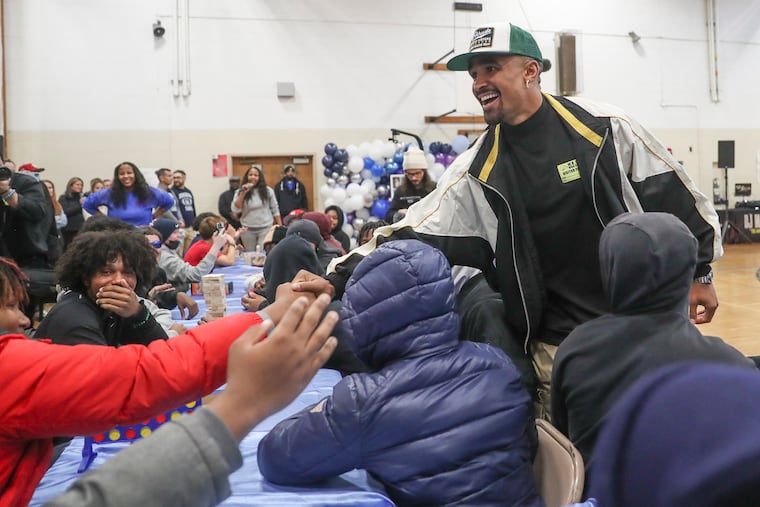Thinking of a New Year’s resolution? Be more like Jalen Hurts.
I invite you to get off the sidelines and into the lives of kids who are hurting.

Up until recently, and for 17 years, I was working as a public school teacher at Parkway Center City Middle College High School. At school, I was always struck by the unlikely groups of adults that would gather in the hallways or during lunch to rehash the Eagles’ triumphs or sorrows.
I am not a football fan, but I know that in this town, sports bring people together. It’s the longing to connect that holds my attention.
I wept when I read that Jalen Hurts visited Walter B. Saul High School earlier this month. The line that got to me was when he said to students, “I’m not in your shoes. I don’t go through the things y’all go through. But I want to help y’all, and be there for y’all.”
Hurts listened intently and with empathy to the family of Nicolas Elizalde, the 14-year-old who attended Saul and was shot and killed outside a football scrimmage at Roxborough High School. He showed up.
It made me think about the listening I’ve done for 23 years as a teacher, and in recent weeks in my new position at Mighty Writers, a nonprofit organization that teaches more than 3,500 students in Philadelphia, Camden, Atlantic City, and Newark to think clearly and write with clarity so they can achieve success.
A week before the Roxborough shooting, during first-period English, a Parkway student shared with me and with her classmates that her home in Strawberry Mansion had been shot at more than a dozen times in recent months. At 15 years old, she had witnessed so many incidents of violence that she had lost count.
She giggled when she said all of this. So did other students. They, too, had experienced so much violence that they could no longer keep track.
I’ve been in enough of these moments before to understand that the giggling was a trauma response. And that student who started the giggling? Well, a week later, she revealed that her brother had been on the field at Roxborough when the shooting happened. Her mom had chosen Roxborough to keep her son away from neighborhood violence. Obviously, that didn’t work.
In my role with Mighty Writers, I have visited after-school centers in Atlantic City, North Philadelphia, and Kennett Square. Within 20 minutes of interacting with kids between the ages of 5 and 12 at each of these sites, a child claimed me — either by pulling me by the hand to a corner of the room, asking if I would be their partner for the day, or eagerly accepting help with homework they already knew how to do.
And, in every single case, the child would begin, without prompting, to tell me a story about themselves that made them cry.
One third grader, with tears streaming down his face, talked about being 4 and watching as his preschool friend was killed in a hit-and-run. A second-grade girl recalled coming across the border from Guatemala as a 3-year-old. She remembered “crying and crying” and how scared she was of “la policía.” Another beautiful kindergartner hugged me, and almost every other adult in the room, so tightly and so immediately that I knew that I wasn’t looking at a particularly loving child, but instead at a child who expressed many of the characteristics associated with disinhibited social engagement disorder.
I wasn’t trying to elicit any of this. It happened because I have, out of necessity, become “trauma-informed.” Kids feel safe with me because I’ve learned to listen carefully and to say aloud the good things I notice about them. But the revelations also happened because trauma is everywhere these days.
Kids in Philadelphia, and in the region at large, are up against guns, the effects of a global pandemic, underfunded schools, unsafe corridors, loved ones with substance abuse disorders, health disparities, overwhelmed social service agencies, unstable housing, a deeply flawed criminal justice system, and well-earned distrust of police.
But I am not here to stand aside and admire these problems. I am here because I have ideas about ways we can follow Hurts off the sidelines and into the lives of kids who are hurting.
All of us must start to take seriously the pain of children who are growing up in a city full of broken systems and distracted adults, many of whom are just busy trying to survive themselves, during a period of outrageous violence that children see firsthand — and then again and again on social media.
Listening, in and of itself, does not have the power to heal trauma. But trauma will not go away on its own. You don’t need a degree in psychology to know what happens to unexpressed pain.
“Trauma will not go away on its own.”
So if you are thinking about a New Year’s resolution, if you are sick of seeing all the evidence of the brokenness of this city, I invite you to be more like Jalen Hurts.
Get curious about the children around you. Find an organization such as Uplift, Covenant House, Squash Smarts, Kensington Soccer Club, or Anderson Monarchs that brings you into contact with them — and then listen, without judgment, to what Philadelphia’s kids are telling you.
You don’t need to be an expert on trauma or a football star to listen to a child. But you do need the fortitude to find a way past broken systems into their lives.
And then, when those children act out or push you away or fail to make you feel good about your efforts, as they will, you need to resolve to stand by them no matter what.
Maureen Boland is a senior writer at Mighty Writers. mboland@mightywriters.org